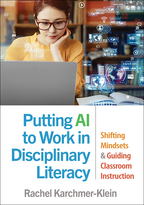Putting AI to Work in Disciplinary Literacy
Shifting Mindsets and Guiding Classroom Instruction
Rachel Karchmer-Klein
Foreword by Amy C. Hutchison
HardcoverPaperbacke-bookprint + e-book
Hardcover
orderJanuary 21, 2026
ISBN 9781462559459
Price: $53.00 207 Pages
Size: 7" x 10"
Paperback
orderDecember 31, 2025
ISBN 9781462559442
Price: $35.00207 Pages
Size: 7" x 10"
e-book
orderDecember 18, 2025
PDF and Accessible ePub ?
Price: $35.00 207 Pages
ePub is Global Certified Accessible
print + e-book $70.00 $42.00
orderPaperback + e-Book (PDF and Accessible ePub) ?
Price: 207 Pages
ePub is Global Certified Accessible
Can generative AI support—not supplant—students’ reading, writing, critical thinking, and problem-solving skills? In this practical, literacy-centered guide, Rachel Karchmer-Klein shows how AI tools like ChatGPT and Copilot can be integrated into grades 6–12 instruction without compromising academic rigor or student voice. Grounded in the principles of disciplinary literacy, the book helps teachers shift their mindsets, explore ethical dilemmas, and design content-rich lessons that keep student thinking at the center. With ready-to-use lesson plans, classroom vignettes, Try It Out activities, discussion prompts, and reproducible planning forms that can also be downloaded and printed, this resource empowers educators to reimagine learning in the age of AI.
“Karchmer-Klein provides educators with practical, evidence-based strategies for classroom transformation, even as states continue to develop AI guidance. This book skillfully bridges theory with actionable implementation, making it an ideal cornerstone for professional development workshops. Teachers and coaches in grades 6–12 will gain concrete examples and strategies to enhance their disciplinary literacy instruction and prepare students for an AI-integrated future.”
—Jeff Kilner, MEd, K–12 Instructional Technology Specialist, Indian River School District, Selbyville, Delaware
“The approach featured in this essential guide transforms generative AI from an intimidating unknown into a powerful tool for advancing disciplinary literacies. Scaffolded classroom activities illuminate how AI can deepen students' critical analysis of disciplinary texts, strengthen their ability to construct evidence-based arguments, and develop their capacity to evaluate and synthesize information through disciplinary lenses. This book empowers K–12 teachers and teacher educators—and their students—to use AI ethically, thoughtfully, and creatively.”
—Jill Castek, PhD, Department of Teaching, Learning, and Sociocultural Studies, University of Arizona
“If you’re one of the many teachers lying awake at night with real concerns about the role of generative AI in classrooms, Karchmer-Klein has created a resource that speaks directly to you. This book tackles the need for teachers to develop AI digital literacies, rather than avoiding these technologies. Through practical stories, authentic activities, and a focus on AI ethics across disciplines, Karchmer-Klein gives teachers tangible tools that will build their confidence for navigating this rapidly evolving landscape. This is the reassuring, research-based guidance that teachers and school systems need to move from anxiety to action in the AI era.”
—Brian Mandell, PhD, science educator, curriculum developer, and former K–12 science coordinator, Virginia
“Drawing on decades of experience in K–12 and university settings, Karchmer-Klein helps educators shift from fear to agency as they navigate the technological advances driven by generative AI. This book features hands-on exercises, reflection questions, lesson ideas, ethical dilemmas, reproducible resources, and practical steps. Rather than leading with tools, Karchmer-Klein leads with learning goals—she uses a sound instructional design framework to help educators align disciplinary goals, learning outcomes, and student needs with AI tools. The book provides a tangible pathway for educators seeking to build AI-literate classrooms, and it is a great resource for teacher educators working with preservice teachers across disciplines.”
—Chrystalla Mouza, EdD, Dean, College of Education, and Gutgsell Professor, University of Illinois at Urbana–Champaign
“As a high school educator, I’m excited to see a resource that helps teachers thoughtfully bring AI into the classroom. In an uncertain world where AI is constantly evolving, it is more important than ever to teach students how to use it responsibly and effectively. This book offers constructive ideas and fresh ways to rethink how we support students’ learning in today’s tech-driven environment.”
—Mandi Fox-McKeen, MEd, Special Educator, U.S. History, Global 9, and English 9 Teacher, Ballston Spa High School, Ballston Spa, New York
Table of Contents
Foreword, Amy C. HutchisonIntroduction
I. How Does GenAI Intersect with the Literacy Skills Essential across Disciplines?
1. GenAI Digital Literacies: Expanding Beyond Traditional Digital Literacy Skills 
2. Addressing the Fears of GenAI in Literacy Instruction
3. Reimagining Instructional Design and Selecting GenAI Tools
II. How Do We Reimagine Instruction for an AI-Infused World?
4. Reimagining Instruction of Problem-Solving Skills
5. Reimagining Instruction of Critical Thinking
6. Reimagining Reading Instruction
7. Reimagining Writing Instruction
III. How Do We Prepare Students for an AI-Infused Workforce and Higher Education?
8. Reimagining Teaching in the Age of GenAI: Preparing Educators for the Present and Future
References
Index
